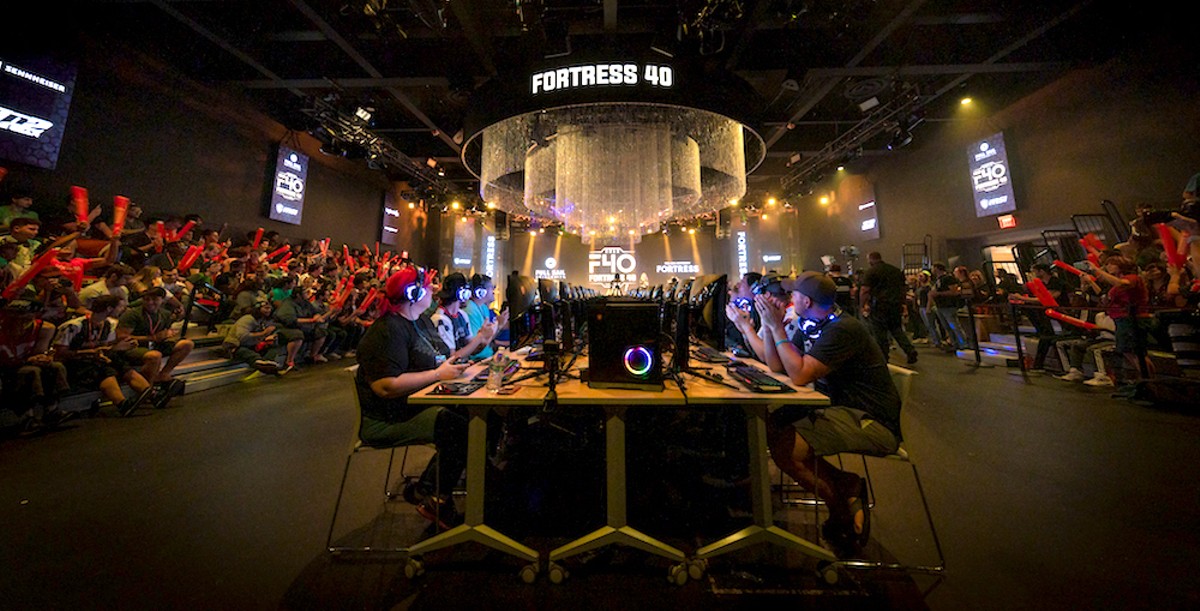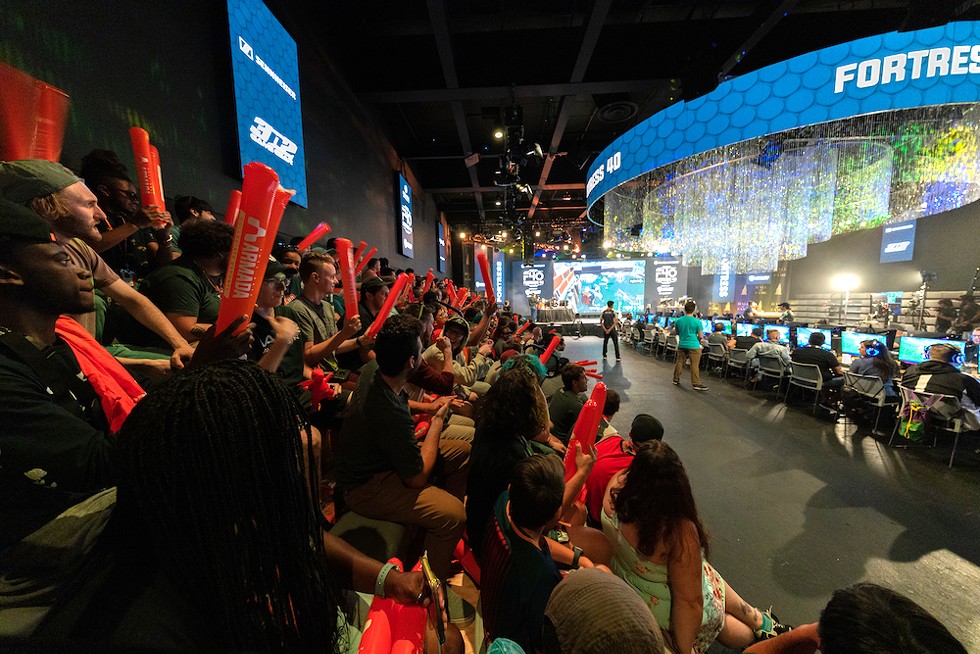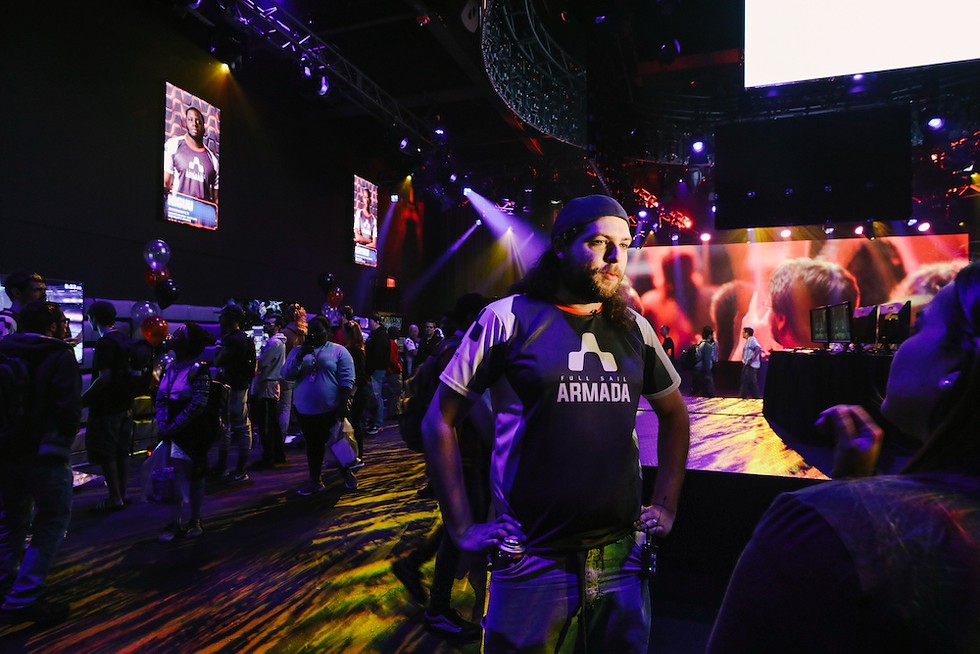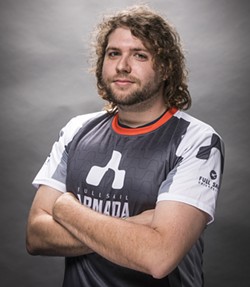It's dark, save for the purple beams bouncing through the fog machine's haze. The bleachers lining both sides of the 500-seat room are full. The players – their focus undivided – take turns walking from the stage to the seats lined in rows underneath a 24-foot, halo-shaped LED display screen overhead.
The players from each team line up in front of their seats. In block letters, the backs of their jerseys read "Bucks gamers" and "Pacers gamers." They sit down, grip their controllers and fix their eyes on the small individual screens placed in front of them, with the same game-time focus you see before a real-life NBA tip-off. One team's visor-wearing coach whacks the back of each player's chair. Thud. "Ready?" he mouths. He's excited. He's jumping up and down. The players nod tensely in response.
Thud. Thud. Thud.
The teams tip off. The match begins. So does the electronic sporting era in Florida.
The NBA 2K League's 2019 "The Ticket" tournament is the first professional gaming event to take place at the Fortress, Full Sail University's new 11,200-square-foot on-campus esports arena. It's home to the Armada, the university's collegiate esports team, which comprises 80 players across 11 titles, including Dragon Ball FighterZ, Super Smash Brothers, League of Legends, Fortnite and Rocket League, among others.
But it's not the tournament that's particularly consequential in the moment, no matter the $180,000 prize or playoff-qualifying glory that's at stake. It's what Full Sail wants to accomplish as it hosts its first major event in the newly opened arena: to carve out a place as Florida's, if not the entire U.S. East Coast's, premier esports venue.
Full Sail announced the $6 million Fortress last October as the largest college esports arena anywhere; it only took a few months to complete, including its dedicated practice space.
Even so, the world of esports is already huge on both the national and international scale, and growing.
What sort of impression can the university hope to make on an already thriving U.S. industry, as well as the worldwide industry? And is Full Sail going to be another college to "spend on the athletes, starve the students," as happens with some other university athletics?
In October 1972, Spacewar players gathered at Stanford University's Artificial Intelligence Lab in Los Altos, California, for what would go down in history as the world's first video game tournament. The event was staged by Rolling Stone writer and editor Stewart Brand, who was working on a feature story about the potential the technology had to change society and inspire creativity.
The prize awarded to winner Bruce Baumgart: a one-year subscription to Rolling Stone. Competitive gaming's momentum accelerated after that.
— In November 1980, Atari attracted more than 10,000 participants when it hosted the National Space Invaders Championship. The Nintendo World Championships, which featured a $10,000 prize, were held for the first time in January 1990.
—The U.S. recognized League of Legends players as professional athletes in July 2013.
—In November 2014, more than 45,000 in-person (and 27 million online) attendees watched the League of Legends World Championships in South Korea.
—Last year, more people tuned into the League of Legends World Championship in November than the NFL's Super Bowl and NCAA men's basketball's Final Four combined. In total, more than 200 million people viewed the tournament on Twitch, the live stream video platform that's helped propel esports into the mainstream world.
—In 2019, the global esports economy topped $1 billion for the first time, a $100 million increase from the previous year, according to Newzoo, which researches esports.
"Let's be honest, [esports] isn't a brand-new thing," says Full Sail esports strategist Bennett Newsome. "It's a brand-new thing for us, for this country, where esports has been kind of an underground thing. But overseas this is normal – this is huge. The viewership for those types of events has been insane."
Esports have gotten so big in the U.S. that colleges are throwing money at newly developed programs; there are currently 200 American colleges offering about $15 million per year in scholarships. The National Association of Collegiate Esports found that students receive on average roughly $4,800 in tuition awards a year.
Full Sail isn't there yet, Newsome says. Despite the state-of-the-art facilities, Full Sail has yet to offer scholarships to any of its players or hire coaches.
"We really want to become the home for all things esports in Florida, specifically, especially at the collegiate level," Newsome says. "We have an administration here at this university that is 100 percent onboard with this initiative and what we're doing, and that is very, very rare. ... There are other schools that are doing really well [with their esports programs], but they're struggling to get their key people to say, 'OK, let's go all in.' So for us to build a $6 million facility on our campus, that's huge already."
Full Sail has never had an actual athletics program. But its degree programs, Newsome says, were always a natural fit for something along the lines of esports.
"We would love to see our students go on to be successful in the world of esports as a competitive player," Newsome says. "We have students who are coming to Full Sail specifically to come into the esports industry to focus on production or graphics, film, lighting. We have our Dan Patrick School of Sportscasting. We have a ton of students who are specifically going to that to become shout-casters" – the equivalent of esports live broadcasters.
Eric Alpizar – who's known as "HeavyCura" on the Armada, for whom he plays Dragon Ball FighterZ – says it was Full Sail's esports program and the opportunity that came with earning an entertainment business degree at the university that lured him to Orlando following a stint in the U.S. Navy. The latter part of his gamer tag is derived from the Spanish word curar, which means "to heal." He says it's a nod towards the time he spent as an EMT.
In between sips from a Nos energy can that's the size of a forearm, Alpizar, 29, says it remains somewhat unbelievable to him "that a college exists that has an esports team in general, let alone one that's running and ready to embrace it."
To what extent will esports expand in the U.S.? Alpizar isn't sure. "But I hope it gets huge so that I can get a job eventually when my skills run out, when the carpel tunnel and arthritis kicks in when I'm 50 and I'm just like, 'What do I do now?'"
Like the rest of the Armada, he's required to maintain a 2.5 GPA as well as a high "professionalism" grade – a Full Sail-specific academic rating that tracks students' professional conduct.
Alpizar says he plays the game he competes in three to four hours a day, four days a week. The only exception is when he takes two to three days off prior to a big match, a similar practice to professional weight-lifters or bodybuilders.
That's not counting the time he dedicates to watching game film, whether that means other high-level players on Twitch or his own film.
"You've got to think about it like sports or anything else – at what point does just shooting hoops in your driveway become work?" Alpizar says. "If you do it right, it doesn't really. But some days you don't really want to go out there, and you just kind of have to persevere and push yourself out there to go do it."
"We've had a stronghold in this space for such a long time," Casey Tanous, a spokesperson for Full Sail, says of the university's involvement in the esports world, including tournaments it hosted prior to building the Fortress.
As Tanous says this, she walks through the swinging doors that lead inside the Fortress' arena. It's the day before the start of the NBA 2K League tournament, and several of the university's tech staffers are scrambling around the room.
"Build it and they will come?" Tanous adds. The eyes of the two reporters behind her widen at the sight of the arena. "It's more like they were here, we needed to build it."
She points up to the digital players' cards displayed on the screens surrounding the arena. Just as you'd see during a live broadcast of an NFL game, the screens rotate short GIF-like videos of each of the 80 Armada players, each clad in their jersey and smirking confidently, arms crossed.
Esports are currently on a "skyrocket trajectory," Tanous says. "There are people who actively want to play. There are people who actively want to watch and just spectate. There are people who are interested in tuning into people who are streamers just talking about it. I really see it as this next wave of entertainment."
It might be. If schools such as Full Sail have already spent such money on these programs, more are certain to follow.
"It's just like everything else in this country – it takes a while to convince the older people that it's cool, or that it could make them money, or that it's interesting," Alpizar says.
Alpizar remembers walking into the living room of his family's home as a kid to find his dad watching professional bowling on ESPN.
"It was the most ludicrous thing I could imagine – that there'd be bowling on television, because bowling's something you do with your crazy uncle on Saturdays and at birthday parties," Alpizar says. "And it occurred to me that that's the same logic people have when I speak to them about gaming and esports – it's like, why would people want to watch you play a game? And I'm like, I don't know; people watch bowling on ESPN."






















